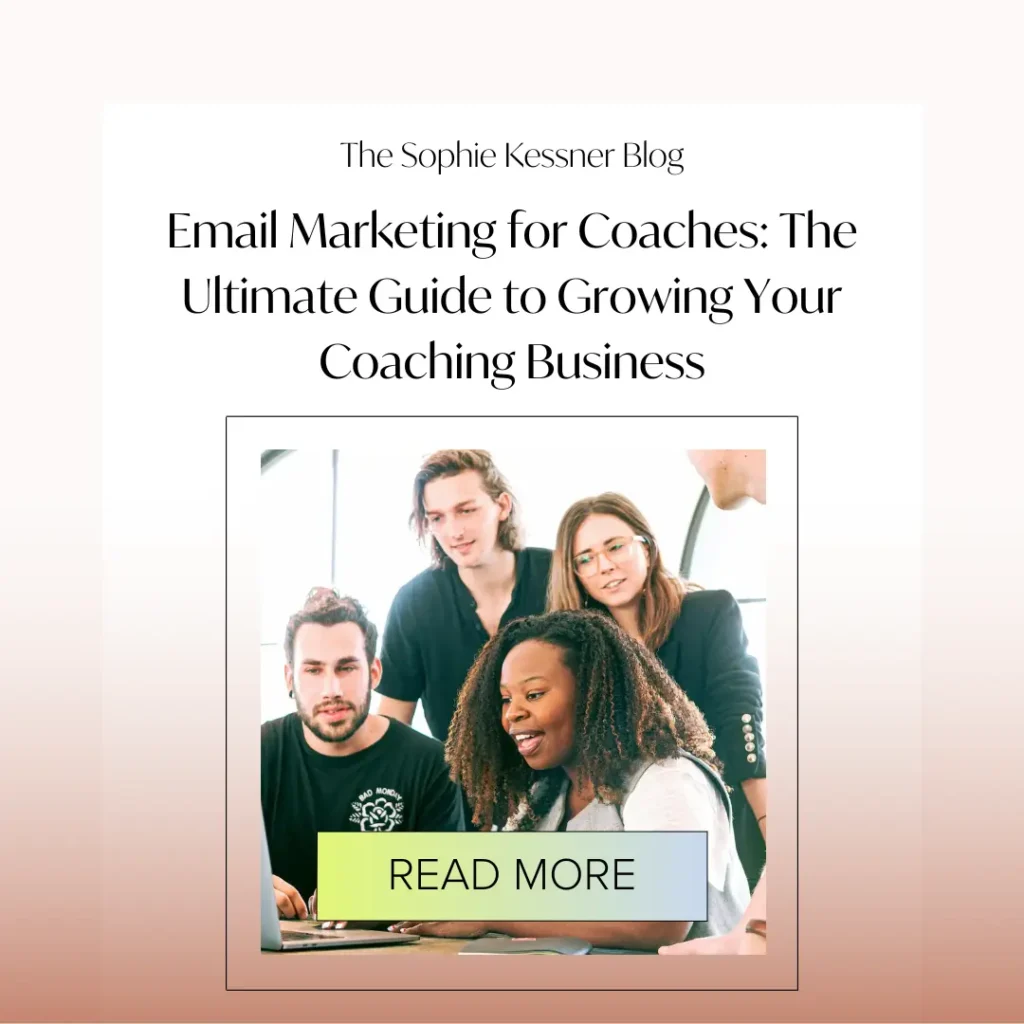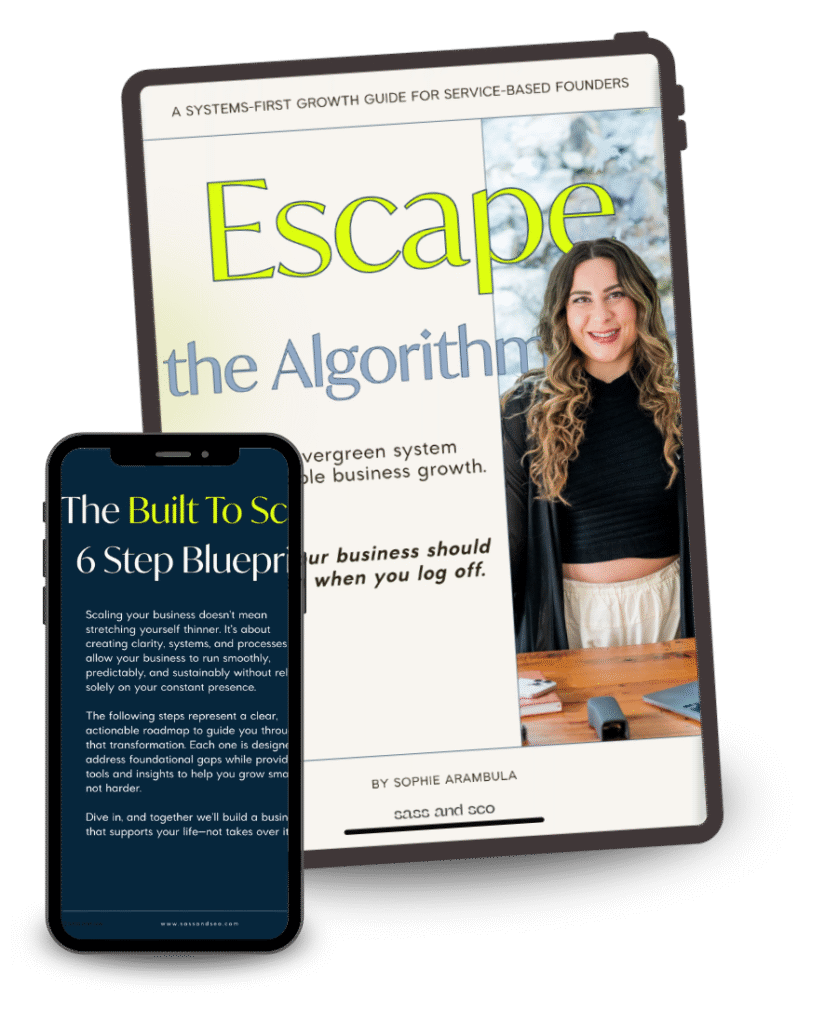Email marketing for coaches is one of the most powerful tools coaches can use to grow their coaching business. Unlike social media channels, email lets you connect directly with your ideal clients, building trust and guiding them through your coaching process. Coaches who invest in email marketing often see impressive returns— Research shows that on average, businesses earn about $36 to $40 for every dollar they spend on email campaigns.
It’s crucial to start email marketing from the very beginning of your coaching business to set a strong foundation for long-term growth.
Whether you’re a life coach, health coach, or business coach, having a clear email marketing strategy can turn new subscribers into satisfied clients and boost your online coaching business. We will walk you through everything from building your email list with lead magnets and opt in forms to creating email campaigns that convert. Ready to take your coaching services to the next level? Let’s get started.
Why Email Marketing is Essential for Coaches

Email marketing gives you a direct line to your potential clients—something social media can’t always guarantee. While platforms like Facebook or Instagram control who sees your posts, emails land straight in your subscribers’ inboxes. This means your message isn’t lost in the noise of social media feeds. For coaches, this direct connection is gold because it lets you build a relationship over time. In fact, coaching-related emails often see open rates higher than average, showing that people interested in coaching are eager to hear from you.
Building Trust and Authority in Your Niche
Consistent emails help you show your coaching expertise and build trust with your audience. When you regularly share valuable insights, tips, and stories, your subscribers start seeing you as the go-to expert in your coaching niche. Trust is key to turning prospects into coaching clients. By delivering helpful content and addressing their pain points, you create a bond that makes them more likely to choose your coaching services when they’re ready.
Cost-Effective Client Acquisition
Compared to paid ads or other marketing channels, email marketing is a cost-effective way to attract coaching clients. Once you build your email list, you own that audience—no algorithm changes can cut off your access. This means your email marketing efforts keep paying off long after you send your campaigns. Coaches often find that nurturing email subscribers leads to higher customer retention and repeat business, making email one of the smartest investments for a successful coaching business. Email marketing is also one of the most effective lead generation strategies for coaches, helping to attract and nurture potential clients.
Scalable Growth for Your Coaching Business
Email automation tools let you scale your coaching business without losing the personal touch. Automated emails, like welcome sequences or nurture campaigns, deliver the right message at the right time to each subscriber. This means you can build relationships with hundreds or thousands of potential clients without spending hours on manual outreach. For example, many coaches have grown their online coaching business by using automated email campaigns to guide new subscribers toward booking discovery calls or joining group coaching programs.
Building Your Coaching Email List

A lead magnet is what you offer in exchange for someone’s email address. For coaches, the best lead magnets solve a specific problem your target audience faces. For example, a life coach might offer a “5-Step Morning Routine to Boost Confidence,” while a health coach could share a “7-Day Meal Plan for More Energy.” Business coaches often create checklists or templates that help clients streamline their processes. The key is to make your lead magnet valuable and relevant to your coaching niche. When your ideal clients see instant value, they’re more likely to sign up and become new subscribers.
Content creation, such as developing high-value lead magnets, is essential for attracting your target audience and growing your email list.
Optimizing Landing Pages for Coach Email Signups
Your landing page is where visitors decide whether to become email subscribers. To boost email sign ups, make sure your landing page has a clear headline, a brief explanation of your lead magnet, and a simple opt in form. Use strong call to action (CTA) buttons like “Get Instant Access” or “Join the Coaching Community.” Keep the design clean and focused, avoiding distractions like extra links. Don’t forget to test different headlines and button colors to see what works best—A/B testing can help improve your conversion rates over time.
Ethical List Building Strategies
Building your email list the right way means respecting your subscribers and following the rules. Always use permission-based marketing—only email people who’ve opted in through your signup forms. This builds trust and keeps your list engaged. If you’re coaching clients in the EU or working with international clients, make sure your email marketing platform supports GDPR compliance. Transparency about how you’ll use their email and offering easy unsubscribe options are must-haves. Ethical list building protects your coaching business reputation and helps maintain high email deliverability.
Converting Website Visitors to Subscribers
Your website visitors are potential coaching clients waiting to join your email list. Attracting organic traffic through valuable content can increase the number of website visitors who join your email list. Place signup forms strategically—like at the end of blog posts, in your sidebar, or as pop-ups on your sales page. Offer incentives that speak directly to their pain points, such as a free coaching session checklist or access to a private Facebook group. Use clear calls to actions like “Join 1,000+ coaches getting weekly tips” to create social proof. The easier and more valuable you make the signup, the more new subscribers you’ll attract to your coaching business.
Email Marketing Strategy for Coaches

A smart email marketing strategy starts with knowing your audience. Segmentation means dividing your email subscribers into smaller groups based on specific traits. For coaches, this can mean segmenting by their coaching interest (e.g., leadership, wellness, relationships), how engaged they are with your emails, or if they’re a prospective client or existing client. A business coach might separate entrepreneurs from corporate executives. An executive coach, for example, could segment their list by industry—such as finance, technology, or healthcare—or by leadership level, like C-suite executives versus mid-level managers, to deliver more relevant content and establish authority in their niche. A health coach might segment by diet preferences or fitness goals.
This tailored approach pays off—email open rates for industries like online courses and business coaching hover around 43%, showing that relevant, targeted emails get noticed. Sending the right message to the right person makes your communication much more effective, boosting engagement and helping you build stronger relationships.
Email Sequence Planning for the Coaching Journey
Mapping out your email sequences is like creating a personalized journey for your potential clients. Think about their path from being a new subscriber to becoming a coaching client. What emails do they need at each step?
- Welcome Sequence: Begins with a welcome email that introduces your coaching services and sets expectations, sent immediately after signup.
- Nurture Sequence: Delivers valuable insights and builds trust.
- Sales Sequence: Gently introduces your coaching services or coaching program. Plan the timing and frequency of these email templates. Don’t bombard people, but don’t let them forget about you either. A well-planned sequence guides prospective clients smoothly through your coaching process.
Content Calendar Development for Coaches
A content calendar helps you stay organized and consistent with your email marketing efforts. It’s your plan for what you’ll send and when. Planning when to create content, such as a new blog post or email newsletter, helps maintain consistency and authority in your messaging. Start by brainstorming themes that resonate with your target audience and address their pain points. What kind of valuable insights can you offer? Think about different content types: short tips, success stories, invitations to webinars, or links to your own blog posts. Balance timely messages (like event announcements) with evergreen content that’s always relevant. This content marketing approach ensures you’re always providing value and keeps your audience engaged, moving them closer to your coaching services.
Balancing Promotional and Value-Based Content
The secret to a successful coaching business email marketing strategy is balance. Most of your emails should offer value without asking for anything in return. Think of it as building a bank of goodwill. Share useful advice, inspiring stories, or free resources. Only a small portion of your emails should be directly promotional, like inviting them to a discovery call or promoting your group coaching programs. A good rule of thumb is the 80/20 rule: 80% value, 20% promotion. This way, your audience looks forward to your emails and is more receptive when you do present your coaching packages.
Email Content That Converts Coaching Clients

Your subject line is the first thing potential clients see—it needs to grab attention and make them want to open your email. For coaches, subject lines that speak directly to your audience’s pain points or goals work best. Examples like “Struggling to Find Clients? Here’s Help” or “Boost Your Confidence in 5 Minutes” show clear benefits. Keep subject lines short and personal, and avoid spammy words like “free” or “buy now.” Testing different subject lines with your email marketing platform helps you find what resonates most with your audience and improves your open rates.
Storytelling Techniques in Coaching Emails
Stories connect people emotionally and make your coaching emails memorable. Share client transformation stories that show how your coaching services helped someone overcome a challenge. Sharing transformation stories from other coaches in your niche can also provide valuable social proof and inspire your audience. Personal stories about your own coaching journey or lessons learned also build trust and authenticity. Keep stories short and relatable, focusing on the problem, the coaching process, and the positive outcome. This approach helps your email subscribers see the real value of working with you and encourages them to take the next step in their coaching journey.
Effective Call-to-Actions for Coaching Services
Every email should have a clear call to action (CTA) that guides your readers toward the next step. Whether it’s booking a discovery call, downloading a free resource, or signing up for a group coaching program, your CTA needs to be simple and direct. For example, you might invite readers to learn more about your business coaching services to help them grow their business. Use action verbs like “Book Your Spot,” “Get Instant Access,” or “Join the Coaching Community.” Test different placements and button colors to see what drives the most clicks. Remember, your CTA should feel like a natural next step in the coaching process, not a hard sell.
Visual Content Strategies for Coach Emails
Adding images, videos, or design elements to your emails can make them more engaging and help explain your coaching expertise. Use photos that reflect your coaching niche or show real moments from your coaching sessions. Short videos or GIFs can highlight key points or introduce yourself personally. Keep your email design clean and consistent with your brand colors and fonts. Avoid clutter—too many visuals can distract from your message. Well-designed emails help your coaching business stand out in crowded inboxes and build stronger connections with your email subscribers.
Automation and Personalization for Coaches

A strong welcome sequence sets the tone for your coaching business and starts building trust right away. Your welcome emails should introduce who you are, explain what subscribers can expect, and offer instant access to your lead magnet or free resource. Keep the tone friendly and personal, like you’re welcoming someone into your coaching community. A well-timed welcome sequence helps new subscribers feel valued and increases the chances they’ll engage with your future email campaigns.
Nurture Sequences That Demonstrate Expertise
Nurture sequences keep your coaching clients and prospects engaged by sharing valuable insights and addressing their pain points. Use these emails to showcase your coaching expertise through tips, mini-lessons, or success stories. This ongoing communication builds credibility and keeps your coaching services top of mind. Trigger nurture emails based on subscriber behavior, like clicking a link or downloading a resource, to make your messages more relevant and personalized.
Sales Sequences That Convert Without Being Pushy
Sales sequences guide your email subscribers toward booking coaching sessions or joining group coaching programs without feeling pressured. Focus on educating your audience about the benefits of your coaching packages and sharing testimonials from satisfied clients. Use clear but gentle calls to action, such as “Schedule a free discovery call” or “Join our next coaching program.” Timing is key—send sales emails after nurturing your list so your audience is ready to take the next step.
Advanced Personalization Techniques for Coaches
Personalization goes beyond using a subscriber’s name. Use behavioral data like past purchases, email opens, or clicks to tailor your email content. For example, send different coaching program offers based on a subscriber’s interests or engagement level. Dynamic content blocks in your email marketing platform let you show customized messages to different segments. This level of personalization makes your emails feel more relevant and increases the chances of converting subscribers into coaching clients.
Email Marketing Tools for Coaches

Choosing the right email marketing platform is key to running smooth email campaigns. Coaches should look for tools that are easy to use, offer automation features, and provide good analytics. Popular options include Mailchimp, ConvertKit, and Flodesk. It’s no surprise that 41% of marketing professionals rank email marketing as the most effective channel—outperforming social media and paid search—so investing in a solid platform is essential. Consider your coaching business stage—some platforms are better for beginners, while others suit growing online coaching businesses with larger email lists. Also, check if the platform integrates with your coaching tools like scheduling software or CRM to save time.
Essential Features for Coach Email Marketing
Look for email marketing tools that include automation capabilities, such as welcome sequences and drip campaigns. Analytics and reporting features help you track how your email marketing efforts are performing, showing open rates, click rates, and conversions. These insights let you improve your email campaigns over time. Also, ensure your platform supports easy creation of opt in forms and signup forms to grow your email subscribers.
Integration with Coaching Platforms and Tools
Integrating your email marketing platform with coaching tools streamlines your workflow. For example, syncing with your online course platform, calendar scheduling software, or integrating with Facebook groups helps nurture your community, generate leads, and automate client onboarding and appointment reminders. Connecting with your Facebook group or CRM system keeps your coaching business organized and your marketing strategy aligned. These integrations save you time and help deliver a seamless experience for your coaching clients.
Measuring Success: Metrics for Coaching Emails

Tracking the right metrics helps you understand how well your email marketing efforts are working. Beyond open rates, coaches should focus on click-through rates, conversion rates, and unsubscribe rates. These numbers show how engaged your email subscribers are and whether your emails are driving action, like booking coaching sessions or signing up for group coaching programs. Benchmarks vary by coaching niche, but keeping an eye on these KPIs helps you spot what’s working and what needs improvement.
A/B Testing Strategies for Optimization
A/B testing means sending two versions of an email to small groups of your list to see which performs better. Test subject lines, call to action buttons, email copy, or images. For example, a business coach might try two different subject lines to see which gets more opens. Regularly testing helps you improve your email campaigns and better connect with your target audience. Make sure to test one element at a time to get clear results.
Tracking Conversions from Email to Coaching Clients
Measuring how many email subscribers become coaching clients is crucial for understanding your email marketing ROI. Use tracking tools and attribution models to follow the customer journey from the first email to booking a coaching package. Many email marketing platforms integrate with CRM systems to track these conversions automatically. Knowing which email campaigns lead to sales helps you focus on strategies that grow your coaching business and improve customer retention.
Conclusion
Email marketing is a powerful tool for coaches looking to grow their coaching business and connect with their ideal clients. By building a targeted email list, creating valuable lead magnets, and sending well-planned email campaigns, you can turn new subscribers into satisfied coaching clients. Social media marketing can complement your email marketing efforts by increasing brand awareness and driving more subscribers to your list. Remember to balance your content with helpful insights and occasional promotions, and use automation tools to save time while keeping your messages personal. Tracking your email metrics and testing different approaches will help you improve your results over time.
Why Consistency in Email Marketing Is Key to Coaching Success
Taking consistent action on your email marketing strategy will help you build lasting relationships and grow a successful coaching business. Whether you’re a life coach, health coach, or business coach, mastering email marketing can open doors to more discovery calls, coaching packages, and group coaching programs. Start small, keep learning, and watch your coaching services thrive.
Boost Your Coaching Visibility with Practical DIY SEO Steps
If you’re looking to improve your online visibility alongside your email marketing, our DIY SEO Course at Sass and SEO can help you get started with simple, practical steps. It’s a great way to attract more coaching clients without relying on paid ads.
Frequently Asked Questions (FAQs)
1. How often should I send emails to my coaching list?
Aim for consistency without overwhelming your subscribers. Sending 1-2 emails per week is a good starting point to stay top of mind while providing value.
2. What’s the best way to grow my coaching email list?
Offer a lead magnet that solves a specific problem your ideal clients face. Promote it through your website, social media channels, and blog posts to attract new subscribers.
3. Can I use social media to support my email marketing efforts?
Yes! Social media channels help you reach potential clients and drive traffic to your landing pages or opt in forms, where visitors can sign up for your email list.
4. How do I keep my email subscribers engaged over time?
Send a mix of valuable content, personal stories, and occasional offers. Using automation tools to deliver nurture sequences helps maintain consistent communication.
5. Do I need special software to start email marketing for my coaching business?
You don’t need anything complicated. Many email marketing platforms offer easy-to-use templates, automation, and analytics that fit coaches at any stage of their business.
Aim for consistency without overwhelming your subscribers. Sending 1-2 emails per week is a good starting point to stay top of mind while providing value.
Offer a lead magnet that solves a specific problem your ideal clients face. Promote it through your website, social media channels, and blog posts to attract new subscribers.
Yes! Social media channels help you reach potential clients and drive traffic to your landing pages or opt in forms, where visitors can sign up for your email list.
Send a mix of valuable content, personal stories, and occasional offers. Using automation tools to deliver nurture sequences helps maintain consistent communication.
You don’t need anything complicated. Many email marketing platforms offer easy-to-use templates, automation, and analytics that fit coaches at any stage of their business.





